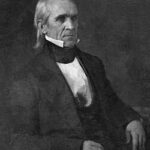President James K. Polk’s request for congressional war authorization against Mexico sparked one of the most controversial debates in American history. On May 11, 1846, Polk declared that “American blood upon American soil” demanded immediate military action. However, critics quickly challenged this assertion.
The Disputed Territory Claim
The incident occurred along the Rio Grande River in genuinely contested land. Mexico claimed the Nueces River as the true border. Texas and the United States insisted the Rio Grande marked their territory. ⚠️ Polk presented this disputed area as unquestionably American soil to Congress. Sixteen American soldiers died in skirmishes with Mexican forces. The president used these casualties to justify his war message.
Congressional Response to War Authorization
Opposition leaders immediately questioned Polk’s version of events. Representative Abraham Lincoln demanded to know the “exact spot” where American blood was shed. Senator Thomas Corwin accused the president of manufacturing a crisis. 📊 The House passed the war declaration 174-14, but debate revealed deep skepticism. Many congressmen felt pressured to support troops already in harm’s way.
Historical Criticism of the Decision
Modern historians widely regard Polk’s congressional war authorization request as misleading. The president deliberately provoked Mexico by moving troops into disputed territory. 💰 His true motivation was acquiring California and southwestern lands for American expansion.
Impact:
Polk’s controversial congressional war authorization created lasting precedents for presidential war powers that continue affecting American politics today. The decision fundamentally altered the balance between executive and legislative authority in military conflicts.
Immediate Political Consequences
🔥 The war declaration split the nation along partisan and regional lines. Northern Whigs accused Polk of waging an immoral war for slavery expansion. Anti-war sentiment grew stronger as casualties mounted and costs escalated. Henry David Thoreau went to jail rather than pay taxes supporting the conflict. The controversy damaged Polk’s credibility and weakened his presidency.
Long-term Constitutional Impact
Polk’s manipulation of facts established a troubling precedent for future presidents. Executives learned they could present selective information to justify military action. 📉 Congressional oversight of war declarations became increasingly ceremonial rather than substantive. The Mexican War precedent influenced later conflicts from the Spanish-American War to Vietnam. Presidents regularly cited imminent threats to bypass thorough congressional review.
International and Territorial Effects
🌍 The war dramatically expanded American territory but intensified slavery debates. Victory brought California, Nevada, Utah, and parts of four other states into the Union. Mexico lost nearly half its territory in the Treaty of Guadalupe Hidalgo. The massive territorial gains accelerated the sectional crisis leading to Civil War. European powers viewed American expansion with growing suspicion and concern about imperial ambitions.
